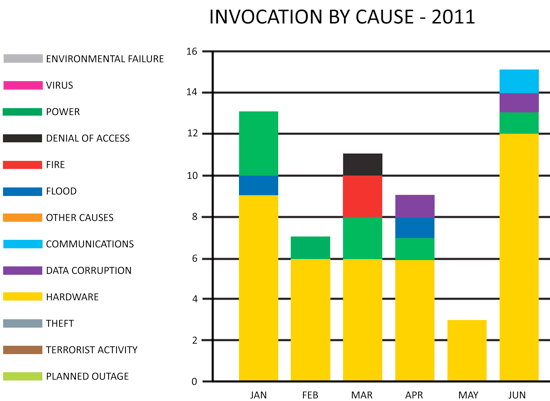/ Home / ICM shares data on the causes of BCM plan invocation
ICM shares data on the causes of BCM plan invocation
ICM Business Continuity has released figures showing the causes of customer invocations from January through to June 2011.
Out of 58 events 42 where related to hardware with 15 attributed to other causes including seven down to power issues and two instances each of Flooding, Fire and Data Corruption. There was even one denial of Access event.
Hardware 'failures' dominate the figures from ICM and reaffirms the need to ensure proper measures are in place to protect the ICT infrastructure across organisations.

ICM state that "94 per cent of ICM’s customers that invoked their business continuity plan did so due to IT problems, with only six per cent accounting for more dramatic incidents such as fire or flood. This means that the day-to-day causes of invocation, such as hardware failure or infrastructure loss, are 15 times more likely to occur than a flood or fire. ICM is therefore warning that businesses assessing the opportunity cost of developing a business continuity plan need to think carefully about how more seemingly mundane incidents can have major impact."
John Mills, Director of Business Continuity and Infrastructure at ICM, added: “In our experience, many organisations focus on the likelihood of a major disaster, such as terrorism, extreme weather events, or fire, when deciding to implement a business continuity plan. However, our invocation statistics prove that it is the ordinary and not the dramatic that can also have significant impact, more often. Organisations in the UK therefore need to reprioritise what is considered a risk and plan for business disruption accordingly."
“In today’s ‘just-in-time’ world, customers are highly transient and the excuse that the IT system is down is no longer acceptable to them. If they can’t get what they want, when they want it, they will quickly go elsewhere – every minute the IT is down, customers are lost. Businesses therefore need their IT to be back up and running quickly, and without an effective business continuity plan in place that is an unlikely scenario.”
ENDS













